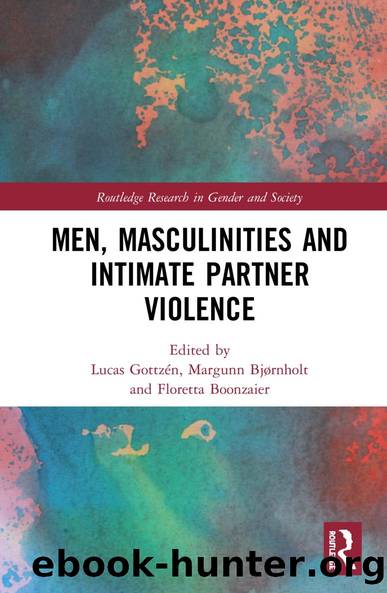Men, Masculinities and Intimate Partner Violence by unknow

Author:unknow
Language: eng
Format: epub
Tags: Nonfiction, Social & Cultural Studies, Social Science, Gender Studies, Sociology
ISBN: 9781000217995
Publisher: Taylor and Francis
Published: 2020-11-05T05:00:00+00:00
Love, romance and intimacy
In my recent writings (Javaid, 2018b), I found that gay and bisexual men do not often have the resources with which to draw on to communicate love, romance and intimacy through languages, discourses and words because
heteronormativity was reinforced through the expectation that the men would have girlfriends/wives and would engage in (hetero)sexual activity, resulting in some of the men being stuck in the closet. In turn, this made it difficult for them to fall in love with another man.
(p. 160)
The lack of words accessible to express emotion and love in gay relationships enables men to configure patterns of hegemonic masculinity, for to socially practice emotions and vulnerabilities disenables legitimation of unequal gender and sexual relations; power and control over oneâs own body and emotions disappear. In gay relationships, I argue that men may be uncomfortable to express emotional needs since such expression runs counter to hegemonic constructs of masculinity. I take this a step further. While constructs of love and emotions are dynamic and fluid through social relations, I suggest that men can draw on love and emotions either discursively or materially when it is desirable and productive in terms of embodying power, as similar to drawing on hegemonic masculinity when it is desirable and productive to achieving power to legitimate unequal gender relations (Connell & Messerschmidt, 2005).
Love is powerful. Practices of love, such as saying âI love youâ, act to secure male rape victims in violent/abusive relationships. Love is blind. The entrapment in gay relationships because of love, of being in love, of falling in love, means that abusive partners are able to form and perpetuate relationship rules that underpin violence as a way in which to circulate power and control and to legitimate unequal gender relations. By doing so, âthe abusive partner is the key decision-maker, setting the terms for the relationship (traditionally associated with masculinity in men) and the survivor is positioned as responsible for the emotional life and care of the abusive partner and the relationshipâ (Donovan & Hester, 2015, p. 199). The violent partner can control the relationship and the love that ties them together, controlling the maintenance of a household, the time the victim is expected to be back at home, and when and how sexual activities take place, etc. (Javaid, 2020). In violent gay relationships, the victims are made to do âemotional labourâ. Not only dealing with their own emotional pains, scars, isolations and torments but also having to manage their violent partnersâ unpredictable emotions. In order to sustain the relationship and to handle the violent partnersâ emotional needs, the victims may feel somewhat responsible to do this emotional work. Demonstrating emotional strength to carry on with the âloving relationshipâ is terribly and dangerously hard work; victims may feel like they are âwalking on egg shellsâ. Despite this, the continuation of love remains, the practices of love continue, and the feeling of love does not fade in as much as the bruising and pains garnered from the physical and sexual violence.
Download
This site does not store any files on its server. We only index and link to content provided by other sites. Please contact the content providers to delete copyright contents if any and email us, we'll remove relevant links or contents immediately.
| General | Men |
| Women in History |
Cecilia; Or, Memoirs of an Heiress — Volume 1 by Fanny Burney(31332)
Cecilia; Or, Memoirs of an Heiress — Volume 3 by Fanny Burney(30934)
Cecilia; Or, Memoirs of an Heiress — Volume 2 by Fanny Burney(30889)
The Great Music City by Andrea Baker(21264)
We're Going to Need More Wine by Gabrielle Union(18072)
Bombshells: Glamour Girls of a Lifetime by Sullivan Steve(13107)
Pimp by Iceberg Slim(12929)
All the Missing Girls by Megan Miranda(12746)
Fifty Shades Freed by E L James(12449)
Norse Mythology by Gaiman Neil(11882)
Talking to Strangers by Malcolm Gladwell(11875)
Crazy Rich Asians by Kevin Kwan(8348)
Mindhunter: Inside the FBI's Elite Serial Crime Unit by John E. Douglas & Mark Olshaker(7833)
The Lost Art of Listening by Michael P. Nichols(6469)
Enlightenment Now: The Case for Reason, Science, Humanism, and Progress by Steven Pinker(6405)
Bad Blood by John Carreyrou(5767)
The Four Agreements by Don Miguel Ruiz(5510)
Weapons of Math Destruction by Cathy O'Neil(5034)
We Need to Talk by Celeste Headlee(4868)
